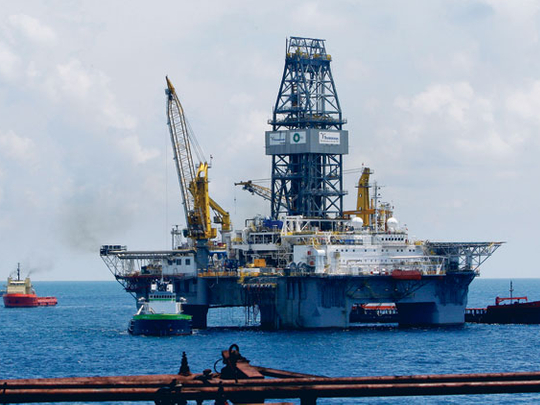
Washington: British oil giant BP has spent $8 billion to battle the Gulf of Mexico disaster, the company has revealed as its crews retrieved key evidence from the seabed.
Robotic submarines recorded the delicate operation as engineers raised a failed blowout preventer from the ruptured well and began lifting it to the surface in order to hand it over to the US Justice Department.
The US government is conducting what could be a criminal investigation into the April 20 explosion and subsequent oil spill and BP is hoping to shift some of the responsibility to its contractors.
The contractors include Transocean, which leased the Deepwater Horizon rig off the Louisiana coast, to BP and Halliburton, which cemented the well.
BP's financial liability will soar if the government determines it was criminally negligent.
The British energy giant has forecast that the world's worst maritime oil spill will cost the group a total of about $32.2 billion, after pushing it into a record $16.9 billion loss in the second quarter.
The oil flow that spewed virtually unchecked into Gulf waters for weeks, was finally stemmed on July 15, after sullying hundreds of miles of shoreline from Texas to Florida. Eleven workers were also killed in the blast.
BP has vowed to meet the costs of the clean-up and compensation for residents hit hard by a fishing ban and the blow to the local tourist industry.
But a top executive warned on Friday that proposed US limits on offshore oil drilling could hurt BP's ability to pay for damages, prompting outrage from environmental groups.
David Nagle, executive vice president for BP America, told the New York Times that legislation before Congress could have an impact on the company's ability to compensate losses from the Deepwater Horizon disaster.
Of particular concern is a bill passed by the House of Representatives on July 30 that includes an amendment banning any company from receiving permits to drill on the Outer Continental Shelf if more than 10 fatalities had occurred at its offshore or onshore facilities, or if it had numerous environmental violations.
Legislation
BP is not mentioned by name in the legislation, but is the only company that currently meets that description.
"If we are unable to keep those [offshore] fields going, that is going to have a substantial impact on our cash flow," Nagle told the daily, and implementation of such a law "makes it harder for us to fund things, fund these programmes" to pay damages.
The Times said BP executives are not backing away from a commitment to pay $20 billion into an escrow fund over the next four years to pay damage claims and government penalties.
The company has also agreed to contribute $100 million to a foundation to support rig workers who have lost their jobs and $500 million for a research programme to study the impact of the spill.
But demands continue to rise on BP, the newspaper noted, including from states affected by the disaster.
"Apparently, BP's efforts to ‘make it right' extend no further than their bottom line," said David Pettit, senior attorney for the Natural Resources Defence Council.
"Petro-money may talk in Congress, but extortion is illegal in the United States. All lawmakers need to stiffen their spines. BP's latest outrage cannot stand."
An estimated 4.9 million barrels of oil gushed into the Gulf of Mexico after the explosion ripped through the rig, sinking the huge offshore exploration platform two days later.












